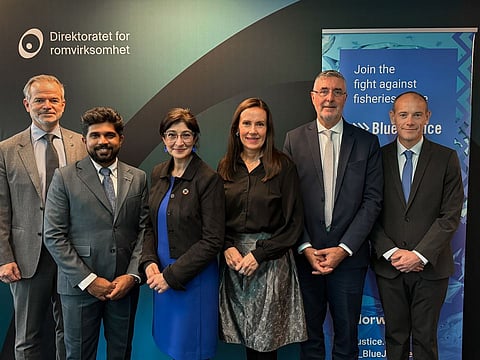

From left: Christian Hauglie-Hanssen (Norwegian Space Agency), Madin Maseeh (Maldives Space Research Organisation), Aarti Holla-Maini (UNOOSA), Marianne Sivertsen Næss (Norway's Minister of Fisheries and Ocean Policy), Jean-Marc Astorg (CNES) and Olivier Minazzoli (Monaco Space Office).
Photo: Norwegian Space Agency.
This week, the Norwegian Minister of Fisheries and Ocean Policy, Marianne Sivertsen Næss, kicked off in Oslo the first meeting of the Space4Ocean council, a new global cooperation between space centers and maritime actors.
The place chosen for the meeting was the Norwegian Space Agency, one of the co-founders of Space4Ocean, together with the UN Office for Outer Space Affairs (UNOOSA), and 29 member countries.
Specifically, Space4Ocean is made up of organizations from around the world that want to share space-based information with developing countries. The goal is to use satellite data to protect the ocean, strengthen preparedness, and give more countries access to important knowledge about activity in their own waters.
"The space alliance that is now in place shows what we can achieve when countries share data, technology, and responsibility for taking care of the ocean. Through Space4Ocean, Norway wishes to contribute to more equitable access to ocean data, support vulnerable coastal states, and strengthen international frameworks for the sustainable use of the ocean," stated Minister Næss.
"Norway has long been an advocate for ocean data being both open and easily accessible. This will contribute to better monitoring of fishing activity, more efficient resource management, and increased insight into climate change that affects coastal communities around the world," she continued.
As mentioned, Norway is taking an active role in this new alliance that will make satellite data more accessible to the countries that need it most. Thus, the Norwegian Space Agency is actively participating in the initiative by contributing Norwegian expertise in space technology and data sharing.
The Norwegian Minister of Fisheries and Ocean Policy, Marianne Sivertsen Næss, signed the declaration on behalf of the Blue Justice initiative.
Photo: Norwegian Space Agency.
In addition, at this week's meeting, the Norwegian Minister of Fisheries and Oceans also signed an accession document on behalf of the Blue Justice initiative, which means that 61 member countries—Peru was the last to join—will have easier access to the new satellite services.
The Blue Justice initiative supports the implementation of the Copenhagen Declaration, which highlights the serious economic, environmental, and human rights consequences caused by crimes throughout the fisheries supply and value chain, such as corruption, tax fraud, money laundering, document fraud, and human trafficking.
Likewise, it also calls for strengthened cooperation among government agencies at the national, regional, and international levels, with special attention to the vulnerabilities of developing countries.
The initiative also includes a range of aid-oriented activities as well as a common digital service for those countries that partner with the declaration through the Norwegian Blue Justice initiative, which supports them in implementing and addressing the Declaration's commitments.
As with the Space4Ocean Alliance, the ultimate goal of all this is to strengthen international cooperation against illegal fishing and fisheries crimes and contribute to a more sustainable management of ocean areas.
